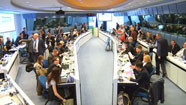On 5 April 2016 the JRC presented the interactive and collaborative online European Energy Efficiency Platform. This beta platform is conceived to fill the gap opened by scattered data and fragmented knowledge resulting from a rapidly growing energy efficiency market. It is expected to be both a one-stop shop for information retrieval and a meeting point for experts to exchange data and reduce redundant activities.
Energy renovation
Renovation is an umbrella term which normally describes a variety of interventions in a building: from modernization, retrofit, restoration and rehabilitation to simple maintenance, repairs and routine upgrades. An energy renovation is often “behind the scenes” of many of these actions, with each action delivering different level of energy savings. For example, an upgrade of a gas boiler in a house will be of lesser importance compared to the insulation of its façade, roof and external walls; the latter offering the opportunity to significantly reduce energy losses from its building envelope, thus improving considerably the energy performance of the house.
Definitional ambiguity
An EU-wide definition of an energy renovation does not exist. While it is widely acknoweldged that an energy renovation should lead to certain energy savings after the intervention work is carried out, a link between the depth of the energy savings and resulting energy savings is not clear.
A number of attempts have been made to relate the renovation depth with relative energy savings or absolute energy consumption levels. For example, the Buildings Performance Institute Europe has considered for its modelling purposes that minor renovations correspond to 0-30% of final energy savings, moderate 30-60%, deep 60-90%, while nZEB renovations represent savings beyond 90% (BPIE, 2011). In a cross-regional review, the Global Buildings Performance Network has concluded that deep renovation can be linked with improvements of at least 75% and/or have a primary energy consumption after renovation of less than 60 kWh/m2 per year (Shnapp, Sitjà, & Laustsen, 2013). This mostly focuses on heating, cooling, ventilation and hot water end uses.
Intervention measures under an energy renovation
An energy renovation can be described in terms of the type of intervention measures undertaken in a building. These can be classified as follows:
- Building envelope:
Insulation of external walls, roofs, lofts, floors; replacement of windows, doors; draught proofing; installation of solar shading systems; employment of natural ventilation techniques, passive solar heating or cooling techniques
- Building technical systems:
Replacement of inefficient boilers with condensing gas boilers; improvement of mechanical ventilation, air-conditioning, lighting, auxiliary systems; installation of heat recovery system; improvement of emission/distribution systems of technical systems (e.g. pipework insulation); installation of building controls; installation of micro cogeneration systems;
- Renewable heat generation systems
Biomass boilers; thermal solar systems; ground, water, air source heat pumps
- Renewable electricity generation systems
Photovoltaic systems, micro wind generation systems, micro-hydro systems
- Other energy-related measures
Energy efficient and smart appliances




To quote this article use the follonwing format: